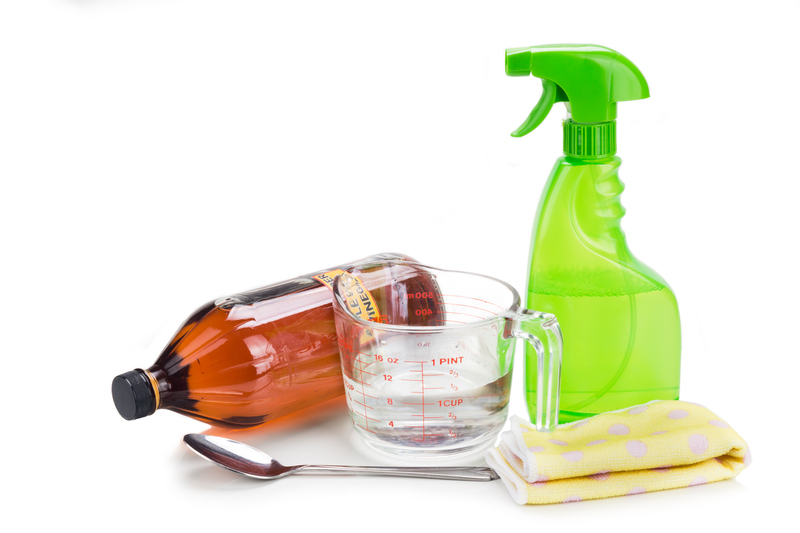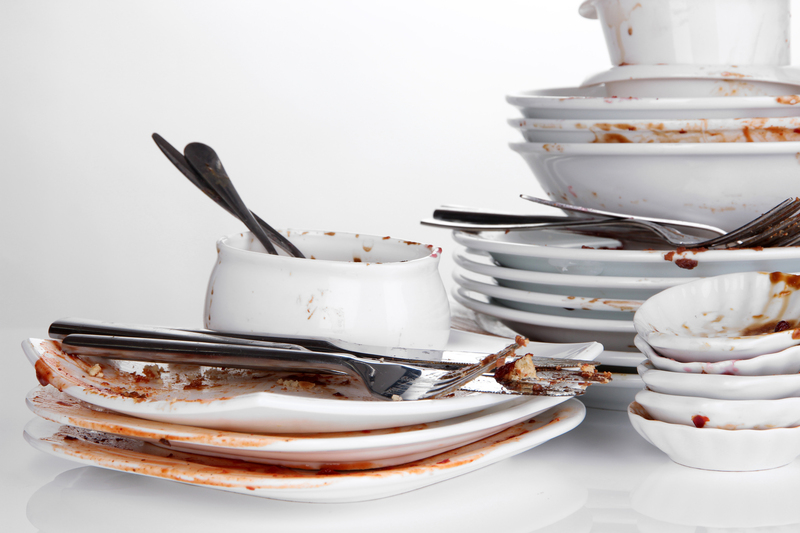Explore Effective Jewellery Cleaning Techniques
Posted on 11/09/2025
Explore Effective Jewellery Cleaning Techniques
If you want your precious jewellery pieces to maintain their shine, brilliance, and value, regular cleaning is absolutely essential. Unfortunately, daily wear exposes rings, necklaces, bracelets, and earrings to dirt, oils, lotions, and chemicals that can dull their sparkle and cause damage over time. Understanding the most effective jewellery cleaning techniques not only preserves their beauty but also ensures their longevity. In this comprehensive guide, you'll discover expert-approved methods for cleaning various kinds of jewellery, from diamonds to pearls, as well as handy at-home solutions and professional care tips.

Why Jewellery Needs Proper Cleaning
Jewellery, whether it's a cherished family heirloom or your favorite statement accessory, collects a surprising amount of grime in daily life. Skin oils, sweat, soap residue, hairspray, perfume, and even the environment can cause gemstones and metals to lose their luster. Neglecting regular maintenance can lead to:
- Loss of brilliance and sparkle
- Metal tarnishing and corrosion
- Weakened prongs or clasps
- Potential scratches on precious gems
- Permanent damage, especially to delicate stones
To extend the life and beauty of your jewellery collection, implementing the right cleaning routine is crucial. Let's explore proven and safe jewellery cleaning methods for a variety of materials.
Essential Tools and Products for Jewellery Cleaning
Before delving into specific techniques, assembling the right cleaning supplies will set you up for success. Here's what you may need:
- Soft-bristled toothbrush or dedicated jewellery brush
- Mild dish soap (free from harsh chemicals)
- Microfiber or lint-free cloth
- Bowls of lukewarm water
- Jewellery polishing cloth (impregnated with cleaning agents)
- Baking soda and aluminum foil (for specific metals like silver)
- Commercial jewellery cleaners (choose reputable, stone-safe brands)
*Remember: Not all cleaning methods or products are safe for every jewellery type. Always check for manufacturer guidelines and stone-specific sensitivities.
General Guidelines for Effective Jewellery Cleaning
- Inspect first: Prior to cleaning, examine your jewellery for loose stones, damaged settings, or other vulnerabilities.
- Gentleness is key: Avoid rough brushes, abrasive cleaners, and high-pressure rinses.
- Dry thoroughly: After cleaning, always pat dry and let pieces air out completely before storing.
- Separate storage: Store cleaned jewellery separately to prevent scratching.
How to Clean Diamond and Gemstone Jewellery
Simple Soap and Water Method
This is one of the most reliable and gentle ways to clean hard gemstones like diamonds, sapphires, and rubies. Here's how:
- Mix a few drops of mild liquid dish soap in a bowl of warm (not hot) water.
- Soak jewellery for 15-20 minutes. This helps loosen oils and grime.
- Using a soft-bristled toothbrush, gently scrub the settings and behind the stones.
- Rinse thoroughly under running lukewarm water.
- Pat dry with a soft, lint-free cloth.
Best Practices:
- Don't use harsh chemicals or abrasive cleaners. Avoid bleach, chlorine, and ammonia with coloured gemstones.
- Be cautious of ultrasonic cleaners. While effective for cleaning diamond-only jewellery, they can loosen fragile settings or damage treated and certain coloured stones.
- Check prongs and settings regularly. Cleaning can reveal loose stones, allowing prompt repair to prevent loss.
Cleaning Gold Jewellery Safely
Both yellow and white gold can develop a dull film from skin oils and exposure to household chemicals. Here's how to revive gold's inherent glow:
- Prepare a solution of warm water and a few drops of mild dish detergent.
- Let gold jewellery soak for 10-15 minutes.
- Gently scrub with a soft brush, especially in crevices.
- Rinse thoroughly with clean water.
- Buff dry using a soft cloth to restore shine.
Avoid using abrasive toothpaste, baking soda, or vinegar on gold as these can scratch its surface.
How to Clean Silver Jewellery
Silver jewellery is prone to tarnishing due to exposure to air and moisture, resulting in a dark or blackened appearance. Here are two effective techniques:
Baking Soda and Aluminum Foil Method
- Line a bowl with aluminum foil, shiny side up.
- Place silver pieces on the foil and sprinkle liberally with baking soda.
- Pour boiling water to cover the pieces; fizzing will occur as tarnish transfers to the foil.
- Let sit for 2-5 minutes, then rinse with cool water and dry with a clean cloth.
Silver Polishing Cloth Method
- For regular maintenance and light tarnish, simply rub silver jewellery with a designated silver polishing cloth.
- These cloths are impregnated with agents that remove tarnish without scratching.
Note: Avoid submerging pieces with attached gemstones using the baking soda method as hot water can damage certain stones or weaken adhesives.
Gentle Cleaning for Pearl Jewellery
Pearls are incredibly delicate and porous, making them susceptible to scratches, discoloration, and damage from chemicals. Instead of traditional liquid cleaning:
- Wipe pearls gently with a soft, slightly damp cloth after each wear to remove body oils and residue.
- If deeper cleaning is required, use only water with a tiny amount of mild soap--never detergents or abrasive products.
- Lay pearls flat on a towel to dry. Avoid hanging strings of pearls, as wet silk thread may stretch.
- Store pearls separately to minimize scratching and avoid prolonged exposure to sunlight.
Specific Tips for Cleaning Costume and Fashion Jewellery
Costume jewellery and plated pieces require special attention:
- Avoid soaking or abrasive scrubbing since water and friction can wear off plating or loosen glued stones.
- Use a damp cotton swab or microfiber cloth to gently wipe down surfaces.
- Dry immediately to prevent moisture from seeping between settings.
Commercial and Professional Jewellery Cleaning Solutions
For quicker results or for pieces with intricate designs, you might consider:
Commercial Cleaning Solutions
- Several reputable brands manufacture jewellery-specific cleaning solutions and dips. Always read instructions and confirm that the product is compatible with your jewellery's metal and stones.
- Avoid generic "silver dips" on composite or set pieces, as they may loosen adhesives.
Ultrasonic Cleaners
- These advanced jewellery cleaning devices emit high-frequency sound waves to dislodge dirt from hard-to-reach crevices.
- Best for solid gold and diamond jewellery. Not recommended for pearls, opals, turquoise, emeralds, or pieces with glued settings.
Professional Jewellery Cleaning
- Periodic cleaning by a professional jeweller is advisable, especially for valuable or antique pieces. They can check for loose settings, polish, and steam-clean your items safely.
Common Jewellery Cleaning Mistakes to Avoid
To preserve the life and luster of your jewellery, be sure to avoid these frequent errors:
- Soaking soft gemstones (such as opals, emeralds, turquoise, and pearls) in any cleaning solution.
- Using ammonia or bleach on soft or porous stones.
- Applying abrasive toothpaste or scrubbing with hard brushes on any piece.
- Exposing glue-set jewellery to excessive moisture or heat.
- Storing cleaned pieces together, leading to scratches.
Care and Maintenance: Keeping Jewellery Clean Longer
- Remove jewellery before bathing, swimming, or exercising. Soap, sweat, and chlorine can cause damage and buildup.
- Apply beauty products (moisturizer, perfume, hairspray) before putting on jewellery to avoid chemical residue.
- Wipe pieces after each wear with a clean, dry cloth to remove fingerprints and oil.
- Store in dry, fabric-lined boxes or pouches designed for jewellery.
- Schedule annual professional cleaning for valuable or frequently worn items.

Frequently Asked Questions About Jewellery Cleaning
Can I use toothpaste to clean jewellery?
While toothpaste is often suggested as a home remedy, it is generally too abrasive for gold and soft gemstones, and can leave scratches. Stick to mild dish soap and water for most cleansing needs.
How often should I clean my jewellery?
For frequently worn pieces, once every 1-2 weeks with a gentle solution is ideal. Delicate or rarely worn items can be cleaned every few months.
Is commercial jewellery cleaner safe?
Commercial cleaners can be safe, but only if they are specifically formulated for your jewellery's metal and gemstone type. Always follow the product's instructions, and when in doubt, consult a professional.
Do ultrasonic cleaners damage jewellery?
These powerful devices can shake loose certain stones or damage softer gems. Use them only for solid gold, platinum, or diamond pieces that have strong settings.
Conclusion: Maintain Brilliance with Effective Jewellery Cleaning Techniques
Learning proven and effective jewellery cleaning methods is essential for anyone who values their favourite accessories and heirlooms. By adopting the right cleaning routine--based on gemstone and metal type--you will keep your jewellery sparkling, safeguard its worth, and enjoy its beauty for many years to come.
Always check for specific care instructions and when in doubt, or dealing with antique or high-value pieces, trust a professional jeweller for safe cleaning and maintenance. With these tips and techniques, you're empowered to keep your collection shining bright, every day.
---For even more tips on keeping your precious pieces radiant, browse our other jewellery care guides or consult with your local jewellery expert.


